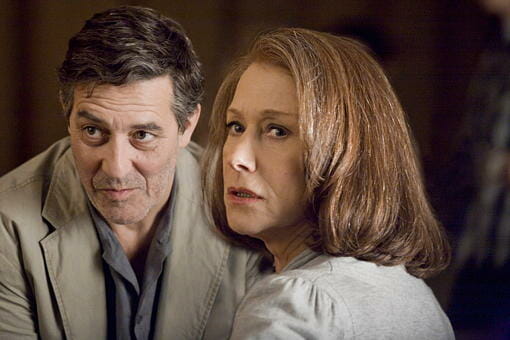By Ryan Mason · September 6, 2011

Movies are balancing acts. The filmmakers must juggle all the different elements, making sure that just the right amounts get added at the right moments or else the whole thing will end up flat like an un-risen loaf of bread. Too much love story and the plot gets muddled. Not enough character development and the conflict packs no punch. Given all the ingredients at play in The Debt’s cinematic concoction, director John Madden performs like a seasoned chef, although, if we’re going to continue down this culinary metaphor, doesn’t quite pull off the last course.
Based off a 2007 Israeli film of the same name, The Debt, tells the story of three Mossad agents, Rachel Singer (Helen Mirren), Stephan Gold (Tom Wilkinson), and David Peretz (Ciarán Hinds), set in 1997, whose mission 30 years prior brings them back together again when Singer’s daughter, Sara, writes a nonfiction book about their patriotic exploits. While we’re introduced to them in their 60s, we get flashes back to when they were all about 30 years old, on a mission in East Berlin to capture the “Surgeon of Birkeneau”, a Nazi war criminal who had never been captured. Miraculously, the spectacular cast portraying the characters in 1997 is trumped by an even better one of Jessica Chastain, Marton Csokas, and Sam Worthington, respectively, as their 1966 counterparts. Not only do the young versions have plenty of chemistry and acting chops, they also physically look like their older selves. One of those casting coups that matches looks with ability.
At its core, The Debt is a heist film, where instead of a monetary treasure at stake, it’s a human being. Tension ratchets up constantly as there seems to be an endless string of scenes that have our main characters seeking to accomplish something just before someone else shows up to find them there doing it. It’s suspenseful and rewarding because it’s not just about the intricate plan that is a staple in heist films; it’s also about the characters. And while it might sound trite, what ends up driving the film is the love triangle that develops between Singer, Gold, and Peretz. Don’t worry: this isn’t some typical Hollywood-type romantic entanglement that gets all schmaltzy. It also never trumps the engine of the film, which starts off being the detailed plot to disappear former Nazi Dieter Vogel, who is now a married gynecologist in Berlin, and ends up being a botched hostage situation. In fact, their intertwining relationships give it all depth and meaning because we truly feel for these three-dimensionally flawed characters and empathize for the situation they find themselves in. Best of all, they never break character to fit some necessary beat for the relationship subplot, keeping everything organic to the plot – which is key since their relationships are what bridge the 1966 storyline with the one in 1997. Until the final sequence, really, this is some excellent writing and filmmaking overall.
While the finale of The Debt doesn’t ruin the entire film, there’s just something that can’t be saved when the final taste in your mouth from a gourmet dinner is a generic-brand cup of tapioca pudding. Where it doesn’t work is when it tries to culminate the action-slash-suspense motif with some geriatric stars. And I’m not talking about Mirren and Wilkinson, who both can hold their own in any role. It truly becomes laughable and completely unbelievable which is such a bummer considering how real and legit the rest of the film felt. But it sort of makes sense given the theme of the film. Essentially, the whole movie is about the question of what is truth: what people believe to be the truth, or what actually happened — and what price you’d pay to reveal the latter. This is why the film doesn’t just tell us a singular tale set in 1966; it has to bring us to 1997 in order to truly tackle that subject. It’s successful as a framing device in the opening of the film and is key in the second act twist. It’s just too bad that the only way the filmmakers found to answer this thematic question was through their rather ridiculous choices in the final act.
Luckily, everything else before that works. And works well. The Debt isn’t perfect by a long shot, but the chemistry between Chastain, Csokas, and Worthington and their tightly plotted, entertaining 1966 plot make this movie. Whenever they’re on the screen, the story sings and we’re captivated. I have to add that I think Chastain is poised for huge things. She not only has the makings of a bona fide movie star but of an Oscar winner, perhaps the next Kate Winslet. Her portrayal of Rachel Singer exudes such strength with vulnerability and humanity, making her the true heart of the film.
So, even when screenwriters Matthew Vaughn, Jane Goldman, and Peter Straughan let the film down in the final reel, it doesn’t stop it from being an engaging, thought-provoking film. Its maturity is very welcomed after a summer of tasty, sugary but unfulfilling treats.